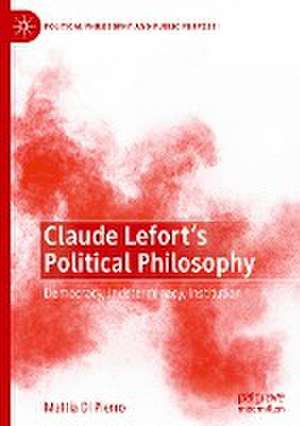Claude Lefort's Political Philosophy: Democracy, Indeterminacy, Institution: Political Philosophy and Public Purpose
Autor Mattia Di Pierroen Limba Engleză Hardback – 22 aug 2023
Din seria Political Philosophy and Public Purpose
- 20%
 Preț: 689.87 lei
Preț: 689.87 lei - 15%
 Preț: 711.56 lei
Preț: 711.56 lei -
 Preț: 387.75 lei
Preț: 387.75 lei -
 Preț: 381.98 lei
Preț: 381.98 lei - 15%
 Preț: 642.36 lei
Preț: 642.36 lei - 15%
 Preț: 640.06 lei
Preț: 640.06 lei -
 Preț: 383.50 lei
Preț: 383.50 lei - 18%
 Preț: 1408.40 lei
Preț: 1408.40 lei - 18%
 Preț: 894.46 lei
Preț: 894.46 lei - 15%
 Preț: 642.51 lei
Preț: 642.51 lei - 18%
 Preț: 946.24 lei
Preț: 946.24 lei -
 Preț: 420.40 lei
Preț: 420.40 lei - 15%
 Preț: 500.73 lei
Preț: 500.73 lei - 18%
 Preț: 784.48 lei
Preț: 784.48 lei - 15%
 Preț: 588.37 lei
Preț: 588.37 lei - 15%
 Preț: 583.45 lei
Preț: 583.45 lei -
 Preț: 425.58 lei
Preț: 425.58 lei - 18%
 Preț: 889.43 lei
Preț: 889.43 lei - 15%
 Preț: 638.43 lei
Preț: 638.43 lei - 18%
 Preț: 780.37 lei
Preț: 780.37 lei - 18%
 Preț: 721.33 lei
Preț: 721.33 lei - 18%
 Preț: 783.50 lei
Preț: 783.50 lei - 18%
 Preț: 789.98 lei
Preț: 789.98 lei - 18%
 Preț: 729.68 lei
Preț: 729.68 lei - 18%
 Preț: 895.89 lei
Preț: 895.89 lei -
 Preț: 391.02 lei
Preț: 391.02 lei -
 Preț: 385.25 lei
Preț: 385.25 lei -

Preț: 783.35 lei
Preț vechi: 955.31 lei
-18% Nou
Puncte Express: 1175
Preț estimativ în valută:
149.90€ • 156.82$ • 124.52£
149.90€ • 156.82$ • 124.52£
Carte tipărită la comandă
Livrare economică 03-17 aprilie
Preluare comenzi: 021 569.72.76
Specificații
ISBN-13: 9783031363771
ISBN-10: 3031363779
Ilustrații: XVIII, 258 p. 1 illus.
Dimensiuni: 148 x 210 mm
Greutate: 0.48 kg
Ediția:1st ed. 2023
Editura: Springer International Publishing
Colecția Palgrave Macmillan
Seria Political Philosophy and Public Purpose
Locul publicării:Cham, Switzerland
ISBN-10: 3031363779
Ilustrații: XVIII, 258 p. 1 illus.
Dimensiuni: 148 x 210 mm
Greutate: 0.48 kg
Ediția:1st ed. 2023
Editura: Springer International Publishing
Colecția Palgrave Macmillan
Seria Political Philosophy and Public Purpose
Locul publicării:Cham, Switzerland
Cuprins
Chapter 1: Socialisme ou Barbarie.- Chapter 2: Society, Reality, Alienation and Ideology.- Chapter 3: The modern symbolic revolution.- Chapter 4: The interpretation of Machiavelli.- Chapter 5: The theory of the political.- Chapter 6: Democracy and Totalitarianism.- Chapter 7: Conclusions.
Notă biografică
Mattia Di Pierro is a Post-Doc researcher at the Philosophy Department of the University of Milan, Italy. His research mainly concerns contemporary political thought, theories of democracy and of modernity. He is the author of L’esperienza del mondo: Claude Lefort e la fenomenologia del politico (ETS 2020) and numerous articles on history of political thought and political philosophy.
Textul de pe ultima copertă
This book proposes a new interpretation of Claude Lefort’s thought focusing on his phenomenological method. Although all scholars recognize the influence of Merleau-Ponty, so far no one has demonstrated the fundamental coherence between Merleau-Ponty’s theory and the main concepts proposed by Lefort; in particular between the concept of institution and the definitions of social and democracy. If Merleau-Ponty uses the idea of institution to think beyond the division between subject and object, to think together continuity and difference, permanence and change, this same concept allows Lefort to understand society as both conflict and unity. From this starting point, this study will attempt to clarify Lefort’s concept of the political and his interpretations of modernity, humanism, and the work of Niccolò Machiavelli. These very concepts will show the difference from structuralism, Michel Foucault’s contemporary theory and theories of immanence. At the same time this study highlights aninternal tension in Lefort’s own thinking: between autonomy and experience, institution and insurgence.
Mattia Di Pierro is a Post-Doc researcher at the Philosophy Department of the University of Milan, Italy. His research mainly concerns contemporary political thought, theories of democracy and of modernity. He is the author of L’esperienza del mondo: Claude Lefort e la fenomenologia del politico (ETS 2020) and numerous articles on history of political thought and political philosophy.
Caracteristici
Follows the intellectual journey of the French philosopher Claude Lefort in the 1950s to his later writings Advances a new reading of Lefort’s philosophy method to the analysis of society and politics Presents a political phenomenology, an ontology alternative to readings of the immanence and autonomy of social
